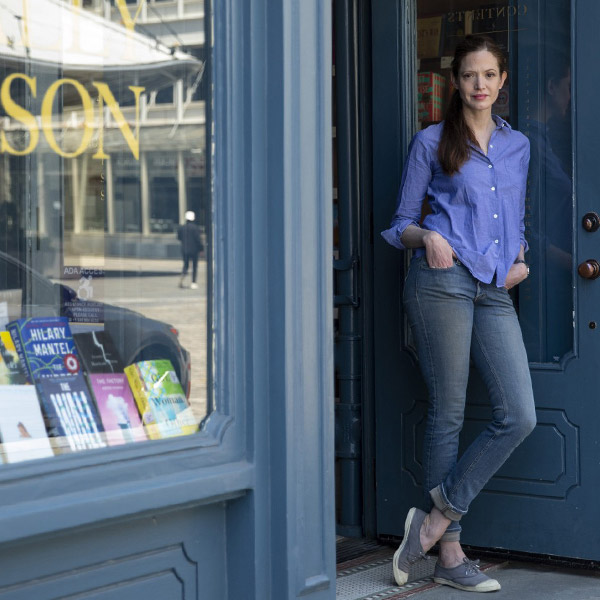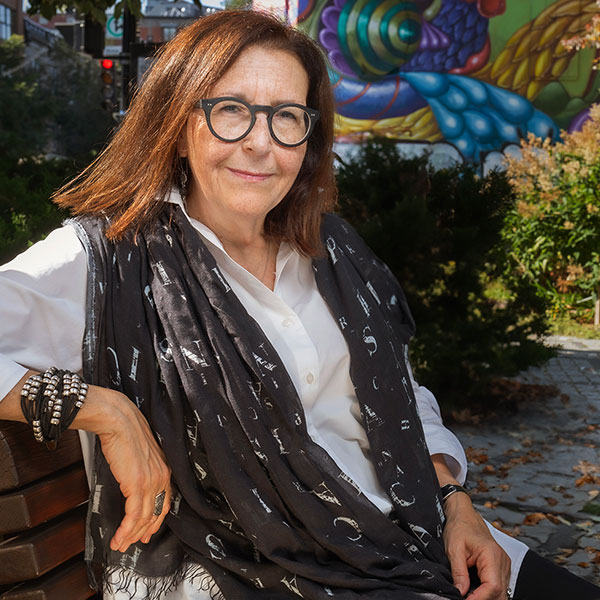Claire Saffitz, MA’13, rose to fame as the star of the Bon Appétit YouTube series “Gourmet Makes.” On each of the 44 episodes, the pastry chef, recipe developer and Bon Appétit magazine contributing editor would be tasked with figuring out how to make a popular snack food. First, she’d deconstruct a not-so wholesome but beloved snack food, like Twinkies or Doritos, then attempt to recreate the industrial item using the sorts of ingredients you might find in a regular kitchen.
The series was a huge hit, attracting more than 300 million views. Her diligent attempts at MacGyvering Skittles and Twizzlers earned her a cult following.
But when it was revealed last year that Bon Appétit often didn’t treat its employees of colour with the same respect or remuneration as their white colleagues, Saffitz decided to strike out on her own.
She wrote a cookbook, Dessert Person, and now hosts a YouTube channel to demonstrate those recipes from her apartment in New York City (cats Felix and Archie make occasional cameos).
Saffitz grew up in St Louis, Missouri, then did a BA at Harvard. Inspired by Julia Child, she went to Paris for an eight-month program in French cuisine. During an externship at a restaurant, she found the work too pressured and not analytic enough, prompting her to return to university.
“I chose McGill largely so I could work with [Canada Research Chair in Early Modern British History] Brian Cowan, whose research and writing on the intellectual history of food in the early modern era was exciting to me,” she explains during an email exchange.
Saffitz adored examining old cookbooks from France and Britain, exploring the intersection of gender, politics, philosophy and food, and looking at the emergence of the restaurant as a social space. “For the first time in my academic career, I felt very connected to the subject I was researching,” she says.
Cowan certainly remembers Saffitz as “a keen student.” Saffitz recently wrote in Chronos, a publication produced by McGill’s Department of History and Classical Studies, that her studies on cooking – ingredients, flavour combinations, methods – sharpened her understanding that any cuisine is “historically rooted, not just a cultural wallpaper.”
Honing the ability to craft an argument is not unlike creating a recipe, in which the disparate steps “should build upon one another and culminate in a way that the whole feels greater than the sum of its parts.” After all, sharp readers can always sniff out when an author is “overreaching or glossing over a point” in either recipes or essays.
She now says her studies help her keep perspective. “I tend to ignore food trends and know that what might feel modern today probably has roots very far back.”
Saffitz describes her stay in Montreal as “borderline monastic” as she focused on her studies, but she did take the time to enjoy some of the city’s delights – trips to Jean Talon Market, making bagel runs, and lingering at Beautys. “I love the maximalism of Montreal cuisine, and that was certainly an aspect of the food culture that I took with me back to New York. Sometimes more is more, and don’t apologize for it!” she says.
Saffitz went to work at Bon Appétit as an editor after completing her master’s, becoming a celebrity when she started hosting “Gourmet Makes” in 2017. She thinks the show’s popularity is due to how it “put creative problem-solving at the forefront rather than predictable recipe demonstration.” She is flattered and gratified by how positively people responded to both her wrestling with Sisyphean labours and the fun she and the production crew had while making the show.
Looking back at the experience, Saffitz says her work at “Gourmet Makes” “produced some uniquely strange (and cool and exciting) personal moments.” Turning up on The Tonight Show, for instance, to put Jimmy Fallon’s cake decorating skills to the test.
When she decided to leave Bon Appétit, Saffitz realized she didn’t “have to accept the status quo,” she says. “I have a greater ability than I previously realized to push back against systems that are inherently unfair. It also motivated me to be more in control of my own career and assume the power to make my own decisions.”
While working on Dessert Person, Saffitz spent a month with her parents, who live in the Boston area, testing recipes daily with her helpful mom. There was so much ambient sugar that they attracted an infestation of ants and had to call in exterminators. “I had never spent that much time with her as an adult. It was a great bonding experience. She contributed a lot to the book and had very helpful suggestions.”
The resulting book recently attracted praise from food superstar Nigella Lawson, who featured it on her site. “I love Saffitz’s recipes, which mix the familiar with the new, and the down-home with the elegant,” wrote Lawson. “Its genius is that it gives all the guidance needed for the novice while still being inspirational for the more seasoned baker.”
Saffitz hopes that Dessert Person, both the book and the YouTube series, will serve as a heartening teaching tool. “I want to encourage some amount of risk-taking in the kitchen, since that’s how people can learn and improve their skills,” she says. More of Saffitz’s inventive recipes are on their way. A second dessert book is in the works.


